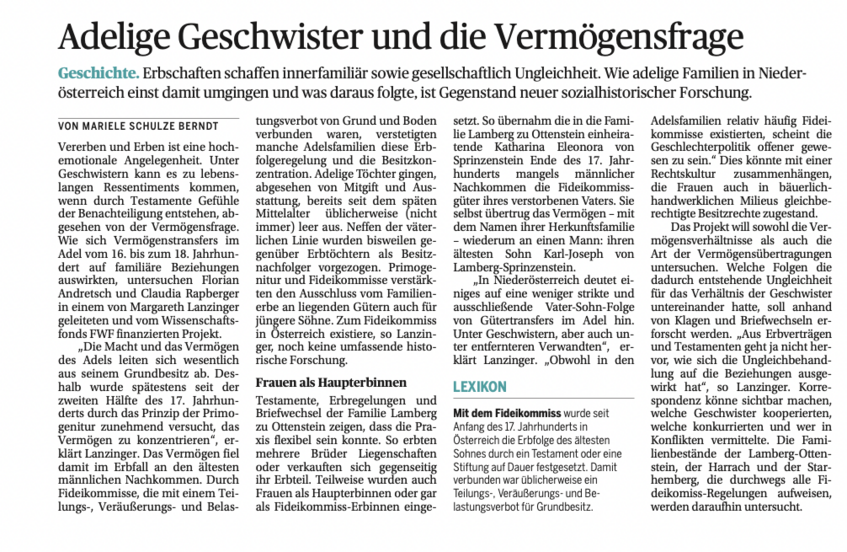Presentation: Noble siblings in teaching
On December 11, 2023 and January 15, 2024, Claudia Rapberger and Florian Andretsch again presented their sub-projects in two course units (070045 UE Proposal Workshop; 070226 UE Quellengattungen, qualitative und quantitative Methoden) and discussed methodology, source criticism as well as the process of finding a research topic with students.
Blog post: fernetzt, Claudia Rapberger
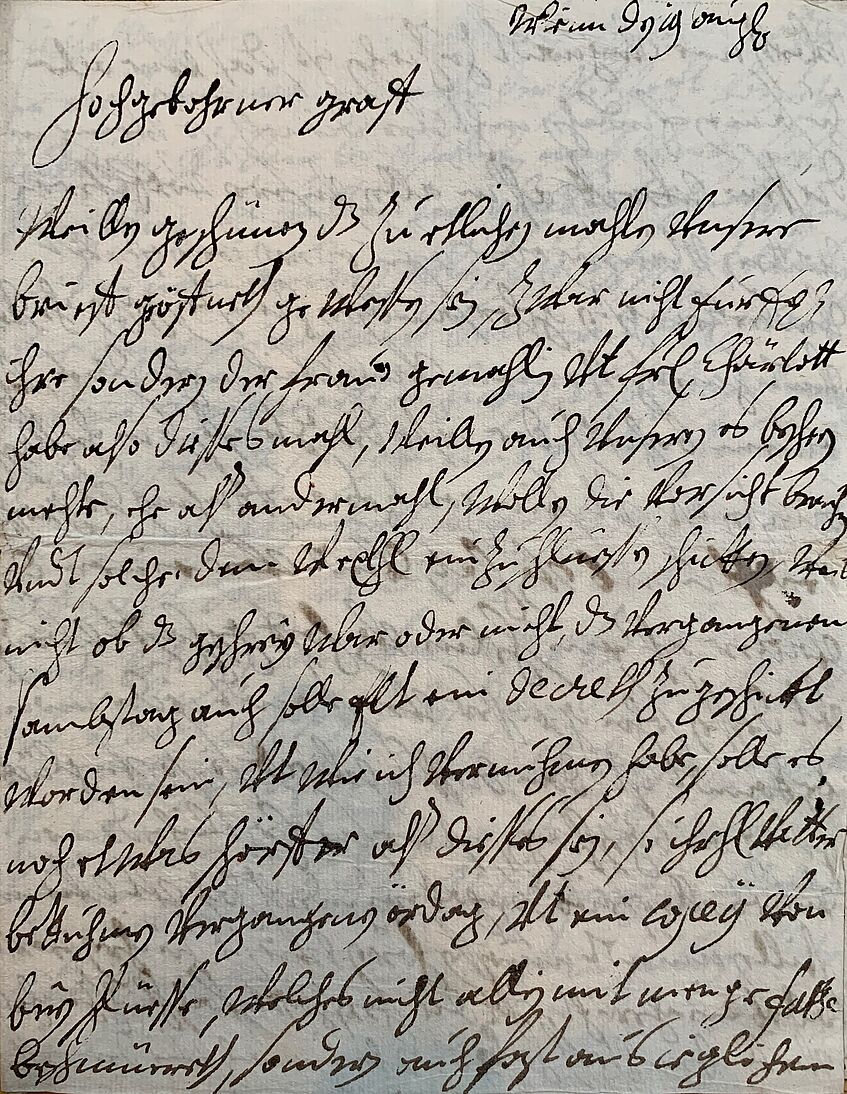
Blog post: fernetzt, Claudia Rapberger
Claudia Rapberger wrote a blog post for "fernetzt - Junges Forschungsnetzwerk Frauen- und Geschlechtergeschichte".
Briefe adeliger Frauen aus der Frühen Neuzeit berichten mitten aus ihrem Alltagsleben. Oder etwa nicht? Die Quellen beziehen sich häufig auf sehr spezifische Situationen, die sich erst durch die Rekonstruktion der komplexen Lebenswirklichkeiten ihrer Verfasserinnen erschließen lassen.
Click here for the full article.
Conference: Pass On. Generational transfers of wealth from the 16th to the 20th century, Freie Universität Bozen 26.-28. Okt. 2023
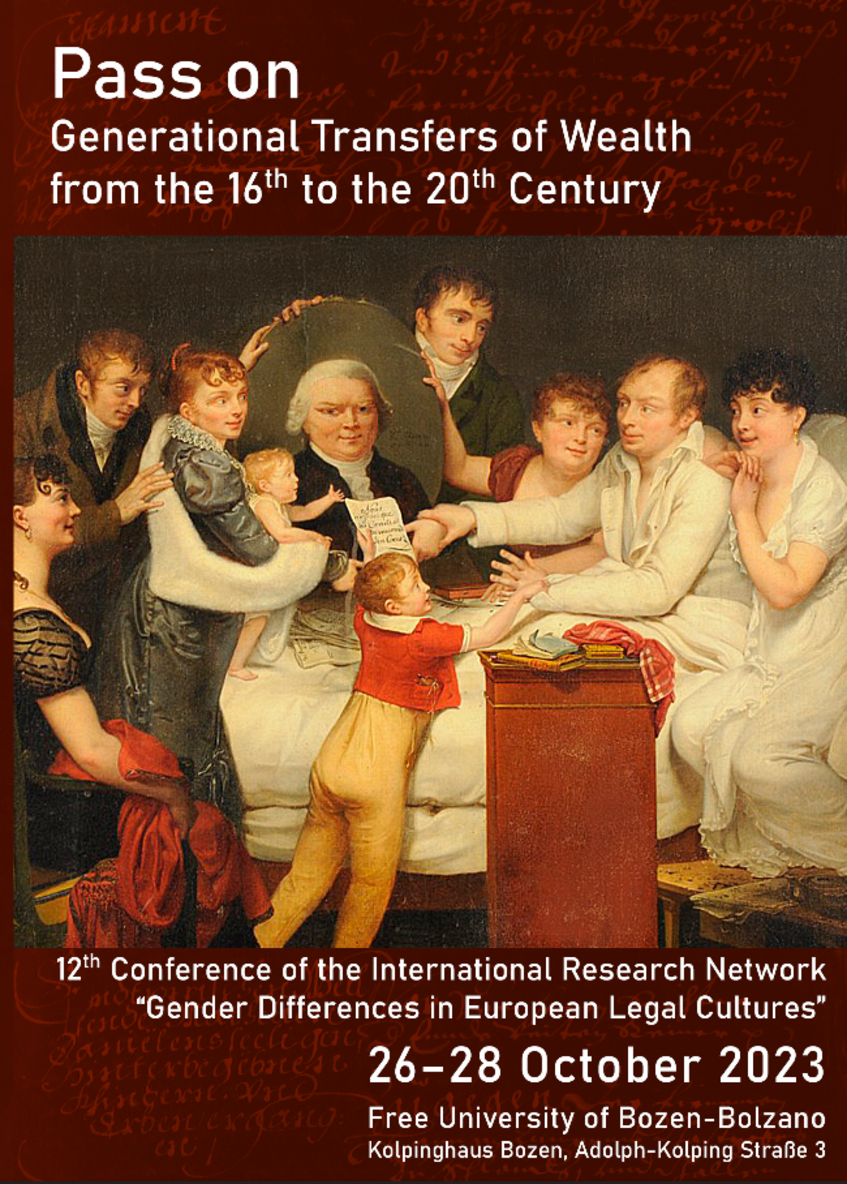
Conference: Pass On. Generational transfers of wealth from the 16th to the 20th century, Freie Universität Bozen 26.-28. Okt. 2023
Since the debate on social inequality has again intensified during recent years, the question of wealth transfer from one generation to another has become even more contested. Inheritance in particular has gained in topicality as a socially relevant issue and is also intensively discussed in the historical sciences: in historical kinship and family research, gender history, social history and material culture research.
The conference takes up this thread of discussion and assumes that access to and disposal of property and wealth were fundamental factors of economic and social positioning. These positionings, the opportunities and perspectives associated with them, but also restrictions, burdens and obligations were largely passed on within the family. Generational transfers of wealth were therefore not private transactions but were framed politically and legally and played a significant role in shaping social power relations, especially gender relations.
The conference focuses on the legal and practical implications of generational wealth transfers and broadens the view in several respects: firstly, all forms of generational wealth transfer are of interest: Inheritance, transfer inter vivos, donation, inheritance ab intestato or by means of a will, transfer of rights of use, management functions, guardianships, leases and fiefdoms, but also intra-family purchases and sales. Attention will be paid to the different types of property, ranging from a prayer book or jewellery, houses/farms and land ownership to entailed estates and entire territories. In particular, the interplay of different generational modes of transfer will be discussed. The transmission of wealth between generations not only affects and models the relationship between parents and children but also that between siblings. Therefore, secondly, it is necessary to examine competitions and alliances as well as the intertwining of vertical and horizontal logics and related family configurations. Thirdly, inheritance law is specifically related to the respective marital property law, which must also be taken into account in order to understand intra-family property transfers in their complexity. Legal possibilities, the question of who was able to use them and how, and how the law was circumvented or instrumentalised in order to enforce particular interests always takes centre stage. In addition to legal foundations, which could differ depending on the type of property, the focus is on the practices and strategies implemented in the families. In order to be able to transfer assets, one had to have the power of disposal over them, and this was very often disputed. Unsuccessful transfers of assets can also be a topic, as can conflicts, challenges and settlements. The exploration of repertoires of action and potential for conflict, as well as conflicts that were actually fought out and the search for strategies to solve them, reveal the social and life-world logics and spaces for action of historical actors.
Programme (PDF)
Workshop: Haushalten mit Verwandtschaft at the Leibniz University Hannover, 12-14 Octobre 2023
Florian Andretsch and Claudia Rapberger participated at the workshop "Haushalten mit Verwandtschaft" at the Leibniz University Hannover . The workshop was the closing event of the FWF-project "The Role of Wealth in Defining and Constituting Kinship Spaces from 16th to the 18th Century". It was organized by Margareth Lanzinger, Janine Maegraith, Matthias Donabaum as well as the cooperation partner Michaela Hohkamp.
Conference: ESTER Research Design Course
From 25 to 27 September 2023, the annual Research Design Course of the European graduate School for Training in Economic and Social Historical Research (ESTER) took place at the University of Vienna. The conference was co-organised by the Institute of Economic and Social History, where the project is based. Claudia Rapberger took part in all programme items of the event and presented her research project as a PhD candidate.
Conference: 54th German Historians' Day
From 19-22 Septembre 2023 the 54th German Historian's Day took place in Leipzig. Florian Andretsch attended the conference and participated as a speaker at the panel "Fragile Finances. Dynasties, Debts and Female Crisis Managers in the Early Modern Period". His presentation "Strafe oder Rettungsaktion? Der staatliche und familiale Umgang mit der Insolvenz eines niederösterreichischen Adelshauses am Vorabend des Reformzeitalters" again dealt with the insolvency of the counts of Lamberg-Sprinzenstein in the mid-18th century, this time with a focus on the role of motherly wealth in providing for noble children in times of debt crisis.

Conference: VINCULUM Project Scientific Meeting
On 6-7 July 2023 the international scientific meeting of the ERC-financed research project "VINCULUM. Entailing Perpetuity: Family, Power, Identity. The Social Agency of a Corporate Body (Southern Europe, 14th-17th Centuries)" took place in Ponte de Lima (Portugal). Twelve participants from five countries held an exchange on various forms of entailing property (fidei commissum, mayorazgo, morgado) in late medieval and early modern Europe. Margareth Lanzinger's presentation "Entail in Austrian contexts: Spanish heritage – differentiated property strategy?" dealt with various approaches of investigating the fidei commissum in Austria and other Germanophone areas. Florian Andretsch's presentation "What could go wrong? The struggle of three Austrian aristocrats to save their family’s new 'Majorat' from war, debt and confident widows in the mid-17th century", demonstrating that entails often had to be altered in the course of economic troubles and that widows defending their financial claims could be central agents in such processes.

Conference: ESSHC
Florian Andretsch and Claudia Rapberger participated in two panels at the European Social Science History Conference (ESSHC) 2023 in Gothenburg and present current research results from the project.
Panel ESSHC 2023: Sibling Relations 1: Early Modern Noble Siblings. Situational Configurations between Alliance and Conflict
Benedetta Borello: Siblings and Half-siblings in Roman Noble Families (17th and 18th Centuries)
Siglinde Clementi: Noble Sibling Relations in the Step Constellation. Tyrol, 16th and 17th Centuries
Liesbeth Geevers: Runt of the Litter: Archduke Charles "the Posthumous" and his Many Older Siblings Claudia Rapberger: Noble Sisters in their Correspondences in 17th Century Austria
Panel ESSHC 2023: Sibling Relations 2: Modes of Sharing - Siblinghood at the Turn of the Modern Era
Florian Andretsch: Non-partitioned Patrimonies Sharing Lower and Upper Austrian Noble Lordships in Fraternal Community, ca. 1600
Stefani Engelstein: Sibling Structures: Nation, State, and Family
Sophie Ruppel: Sharing Knowledge: Brothers in Science around 1800
Charlotte Zweynert: Shared Economies. Sibling Households of Writers around 1800
Workshop: PhD-Workshop for Economic Social and Environmental History
On 27-28 February 2023 the annual "Dissertant*innentagung für Wirtschafts-, Sozial- und Umweltgeschichte" was held the University of Natural Resources and Life Sciences (BOKU). Eight doctoral students from various currents in history and the social sciences presented their doctoral theses in papers and presentations and discussed with experts and peers. Florian Andretsch participated at the meeting as a speaker, he presented his approaches to the quantitative part of his research.
Presentation: Noble siblings in teaching
On November 8th and December 5th, 2022, Florian Andretsch and Claudia Rapberger presented their sub-projects, their methodological and theoretical approaches as well as background knowledge on family and kin relations in the Austrian nobility in two courses (070008 UE Methodenkurs; 070020 UE Quellengattungen, qualitative und quantitative Methoden). With the students, they held lively discussions about how to best find a research subject, how to elaborate methodologies to treat research questions and how to gain knowledge from different types of sources.
Workshop: "Debt. The Good, the Bad and the Hidden. Bringing Family, Kin, Commerce and Consumption Debts Together"
From 15-17 September 2022, the international workshop "Debt. The Good, the Bad and the Hidden. Bringing Family, Kin, Commerce and Consumption Debts Together" took place. It was organized in the confines of the FWF funded project "The Role of Wealth in Defining and Constituting Kinship Spaces from 16th to the 18th Century". The event was attended by 14 speakers from seven countries, their contributions analyzed and discussed practices of lending and debt repayment from the late middle ages until the 19th century. Florian Andretsch participated as speaker, his contribution "Punishment or Bailout? The Gouvernmental and Familial Management of a Lower Austrian Noble House's Bankruptcy at the Eve of the Reform Era" dealt with the insolvency of the Lower Austrian counts of Lamberg-Sprinzenstein in the 1730s, its causes and its consequences. Claudia Rapberger participated as chair for the workshop's second and summarized the event in a contribution to H-Soz-Kult.
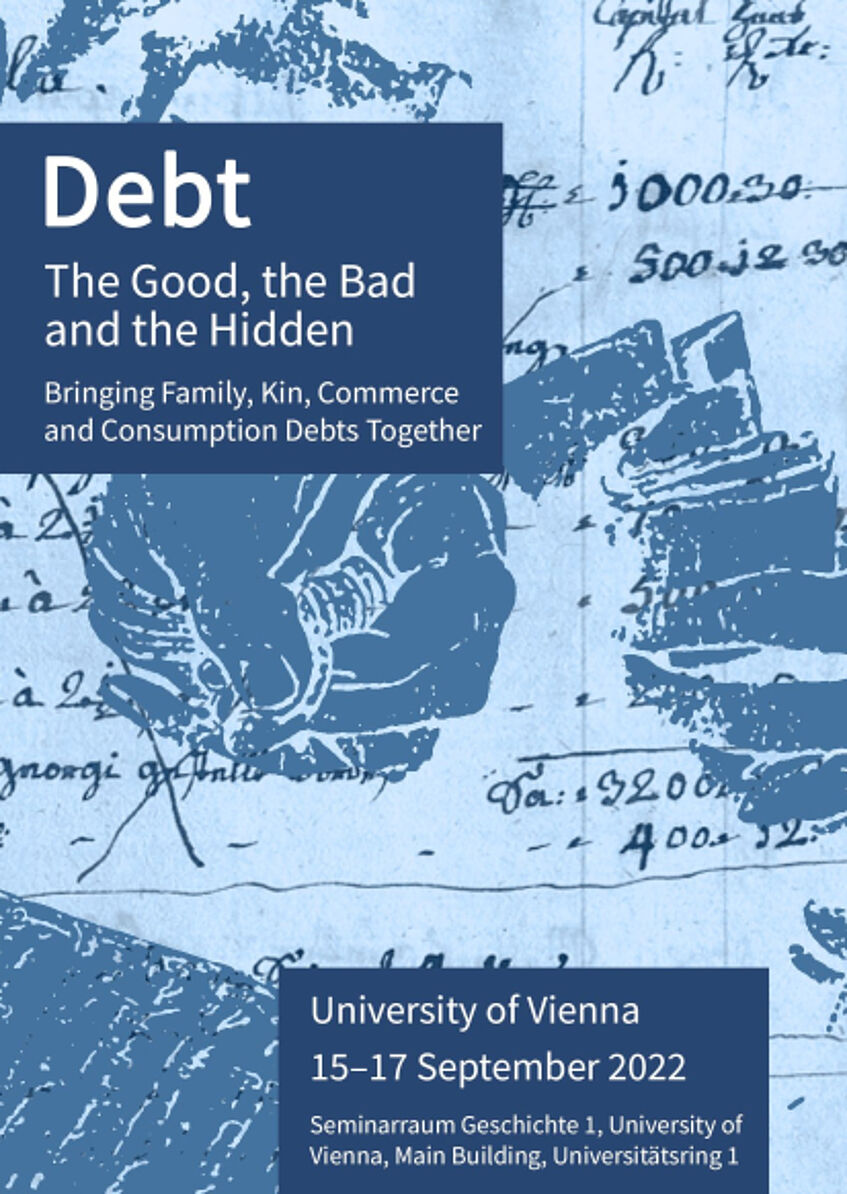
PhD students' workshop
The PhD students' workshop was organised together with the cooperation partner Michaela Hohkamp. The participants presented their dissertation subjects and explained the current state of their work process. In the joint exchange, it was possible to address the problems that arose and to work out solutions and further concepts.
During the workshop, the participants also attended Charlotte Zweynert's lecture in which she presented her dissertation "Das Haus der Schreiberin: Anna Louisa Karsch (1722–1791), Caroline Luise von Klencke (um 1750–1802) und Helmina von Chézy (1783–1856). Geschlechterökonomien und Vermögen in der Transformationsphase um 1800".
The event concluded with a plenary discussion chaired by Hannah Elmer.
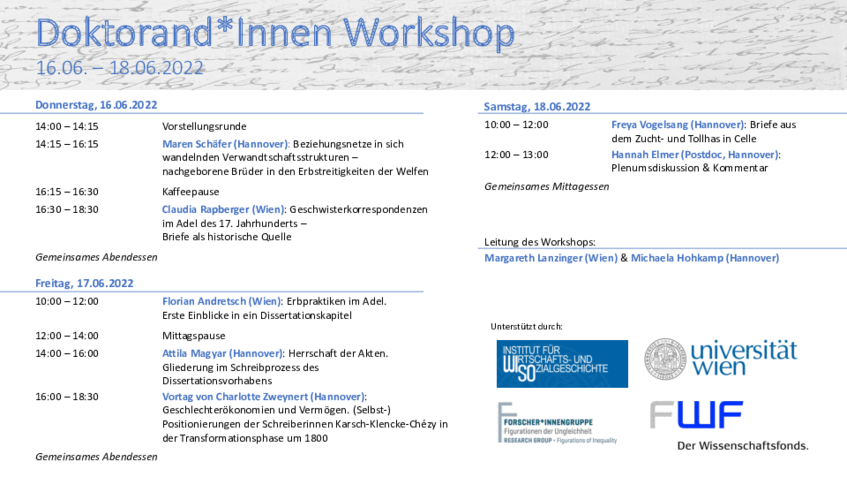
Media Coverage of the Project in "Die Presse"
On February 26, a report by Mariele Schulze Bernt on the FWF project "Noble Siblings: Wealth Arrangements & Social Configurations" appeared in "Die Presse". The article presents the project and addresses some important aspects of the research questions. The project was thus made accessible to a new audience.
Konferenz: ESTER Research Design Course 2021
From 15-17 Octobre 2021 the annual Research Design Course of the European graduate School for Training in Economic and Social Historical Research (ESTER) took place in Lisbon. Florian Andretsch presented the outline of his doctoral thesis and discussed his approaches with experts and peers.

